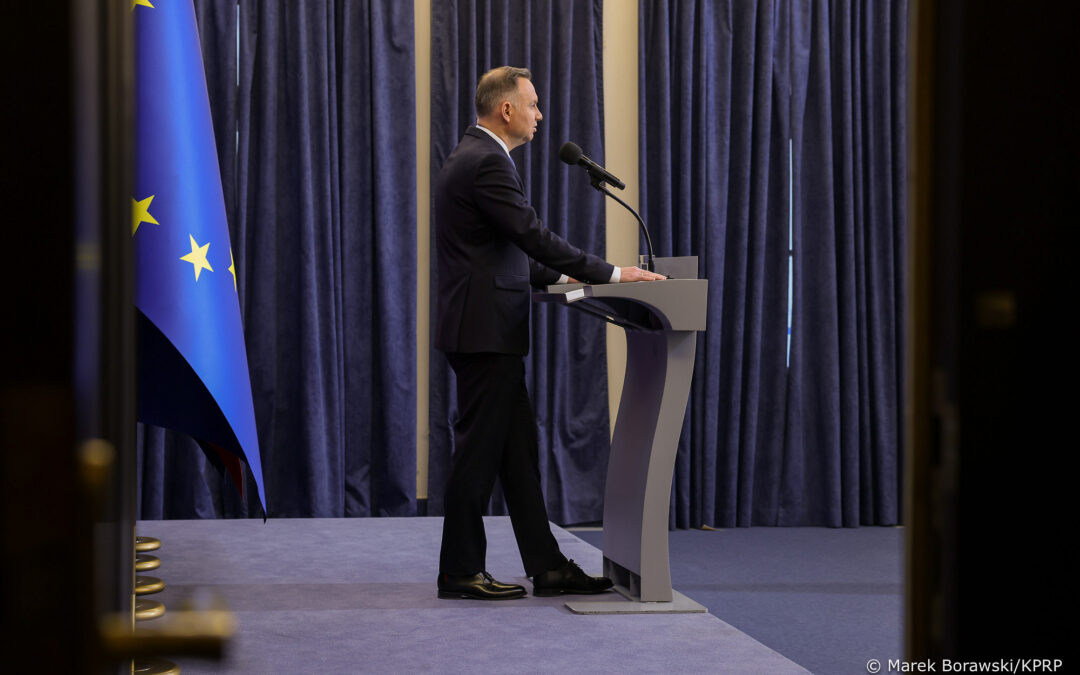President Andrzej Duda has vetoed legislation passed by Poland’s national-conservative ruling Law and Justice (PiS) party that would have centralised government control over schools.
The education minister has argued that such a law is necessary to prevent “moral corruption” of children. Duda, however, says the government failed to obtain “social acceptance” for the measures, which the opposition and many experts have argued were intended to increase political control over education.
Duda, who is a former PiS politician and generally a government ally, has used his veto powers quite rarely since coming to power in 2015. But this is now the second time this year that he has blocked efforts by the government to increase its powers over schools.
Decyzja Prezydenta @AndrzejDuda ws. nowelizacji Prawa oświatowego pic.twitter.com/pIIByDste3
— Kancelaria Prezydenta (@prezydentpl) December 15, 2022
“I refuse to sign this bill,” said the president today. “I understand that some people will be disappointed, but a large part of our society will be calmed by this [decision].”
He noted that he had received over 130 protest letters against the law, some signed by dozens of organisations, with political views ranging from left to right.
“Entities from all sides of the political scene find points in this act that they have very serious doubts about and against which they protest,” said Duda. “Unfortunately, it has not been possible to achieve what I would call a social compromise…The bill has not received wide social acceptance.”
The president emphasised – as he did when vetoing a similar law in March – that Russia’s war in neighbouring Ukraine makes it all the more important for “us to have peace” at home rather than conflict and division.
The law, if passed, would have allowed government-appointed provincial education superintendents to suspend headteachers if they conclude there is an “urgent threat to the safety of students during activities organised by a school”.
Schools would have had to submit details of extracurricular activities for the superintendent’s approval at least two months before they take place. The legislation also introduces additional hurdles for seeking the consent of parents for such activities.
Opponents of the measures say they were intended to prevent certain outside groups – such as sex educators or those speaking about LGBT issues – from entering schools.
The education minister, Przemysław Czarnek, has been a leading figure in the government’s campaign against what it calls “LGBT ideology”, which Czarnek claims “comes from the same roots as Nazism”. He has also pushed for restrictions on “morally corrupting” sex education.
Regional education superintendents have enforced the government’s conservative line, including one who warned in mid-2020 that young people are threatened by an “LGBT virus” even more dangerous than COVID-19.
In theory, the government could now overturn Duda’s veto if it obtained a three fifths majority in the Sejm, the lower house of parliament. However, in practice that would be impossible for it to achieve given that it has only a narrow majority in the chamber.
Speaking after Duda announced his veto, Czarnek told news service Interia that he was “disappointed” by the decision. He added that he also “does not understand” it given that “the president has praised this law” in the past.
The decision was, however, welcomed by the head of Poland’s largest teachers’ union, Sławomir Broniarz, who expressed gratitude that Duda has listened to the concerns of educators about “this bad law”.
The president’s wife, Agata Kornhauser-Duda, was a teacher before becoming the first lady. Earlier this year she invited opposition MPs to meet with her and discuss their concerns about the government’s proposals.
Today, one of those MPs, Katarzyna Lubnauer of the liberal Modern (Nowoczesna) party, hailed Duda’s veto as “a great victory for Polish schools, for all NGOs, for parents, children and all those who participate in education”.
Main image credit: Marek Borawski/KPRP

Daniel Tilles is editor-in-chief of Notes from Poland. He has written on Polish affairs for a wide range of publications, including Foreign Policy, POLITICO Europe, EUobserver and Dziennik Gazeta Prawna.




















